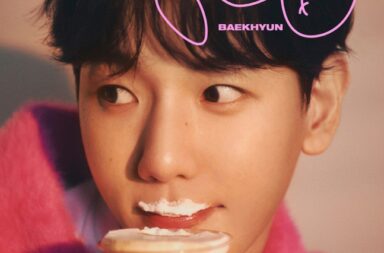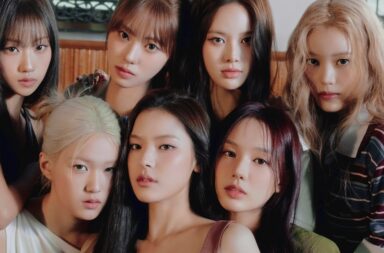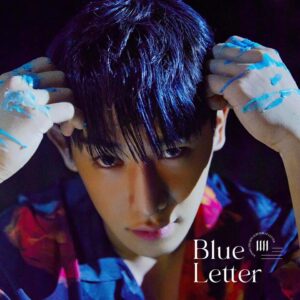
The color blue can evoke a variety of imagery: blue skies, playing the blues, being blue, or waves crashing on the shore of a beach. While the images that can be represented by this color are wide reaching, there is also scholarship that suggests that humans have an innate love of the color blue because it reminds us of clear blue skies and peaceful landscapes that offer a sense of comfort or peace. Not only do we find it beautiful and peaceful, but it can also us cognitively and affectively, prompting us to spend longer in stores or help make streets safer. At first glance, Wonho’s Blue Letter is just a collection of sentimental, dance songs, but they also bring comfort through a variety of personifications of the color blue.
The intro to the album “Intro : Seasons and Patterns” reinforces this notion. With its piano driven melodies, lack of vocals, and soaring, film score-like development, it sounds like the opening scene of a rom-com, driving with the windows down under the expanse of a blue, cloudless summer sky. New seasons and patterns often represent rebirth, growth, and change. Likewise, after the track reaches its climax, all the instruments die away except the singular persistent piano melody from the very beginning, leaving a lonely, bittersweet sound in its place. This intro serves as an effective tease of all the dynamics explored in the remainder of the album.
The title track “Blue” and “24/7” are upbeat, uplifting tracks that sound like a fun day on the beach while “No Text No Call” and “Come Over Tonight” are contemplative, smooth, and lilting like a slow, rainy day. Taking the metaphor a step further, “Stranger” is a melancholic and reflective ballad that expresses what it feels like to be a stranger when left alone feeling blue.
“Blue” and “24/7” are the sleek, upbeat, and uplifting songs on the track list, so it comes as no surprise that these are the promotional songs this comeback, and choreography for both is bubbly, clean, and impactful. Also, from all of his activity on his socials, he seems especially close to his dancers since going solo, and this really shines through in his interactions with them on and off stage. It lends a nice, playful dynamic to the songs, reinforcing the happy and end of summery nature of them.
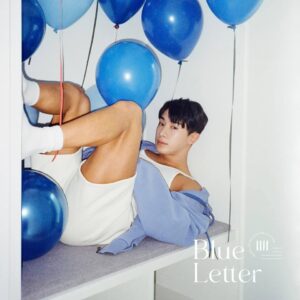
The title track “Blue” sees Wonho dressed up in (American) football gear and jerseys, training, winning a trophy, and celebrating with his teammates, often played by his dancers. While he cleverly jokes that he has never really played football, the video is surprisingly well acted with a variety of sets and outfits. Most prominent are the football fields, the diner and casual clothes, and the sleek all white, water room sets. Lyrics talk about “feeling the blue” and how he “can’t get enough” of their romance while the music remains straightforward pop, complete with clap tracks and a funky electric bass line. The refrain of “we are young, we are dumb, we all party all night long when you feel, feel the blue” more accurately outlines the come-with-me allure of this fun track. Here, the use of blue embodies a feeling of ease, fun, and carefree attitudes that lead to budding romance and thriving friendships.
The B-side “24/7” by comparison is sleeker and sexier, with a reassuring message of staying forever young growing and thriving forever, a message likely not only for the listener, but his fans in general. The song is more bass and midi forward with really unique vocal doubling underneath Wonho’s own vocal lines in the verse. The close harmonies give the illusion of multiple people singing and creating a thicker texture against the instrumentals. Overall, it makes a nice, slightly sexier compliment to the title track.
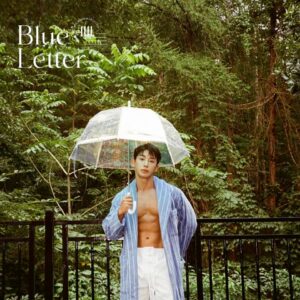
If “Blue” and “24/7” are upbeat and happy songs on Blue Letter, “No Text No Call” and “Come Over Tonight” are soft and tempting, like the promise of a warm embrace on a rainy day. Both songs lament lack of or loss of connection, urging listeners to take a chance on romance rather than loving from a distance. The connections to the color blue are a bit looser here, but generally correlate to desire and a tinge of hesitant sadness.
Repetitive and slightly teasing, the former track “No Text No Call” sports English lyrics and more acoustic instrumentals. The structure of the song is simple and the texture is much thinner and intimate. “Come Over Tonight” by comparison has a busier drum set part and more full vocal layers. The melody is similarly repetitive, but with an addictive, sensual lilt mostly absent from “No Text No Call.”
The last track on the album “Stranger” is all sad with little relief. While it is the most different from the title track, it is one of the most effective and memorable. With lyrics like “the blue sea falls asleep,” “the night is deep without you,” and “sometimes I feel like a stranger” Wonho describes feeling lost and alone when left with only your thoughts as company. In the song he only wants to sleep comfortably, watching as time passes and struggling to cope with the loss of his love. Feeling blue and the comparison of feeling like a stranger in one’s own reality is a poetic and relatable one, one that can be felt by listeners from a variety of contexts. While it is likely destined to fade into Wonho’s discography amongst his growing number of tear-jerking ballads, this one sticks out as especially well produced and composed to convey its message.
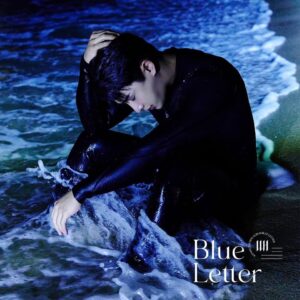
Wonho’s new album Blue Letter is an exploration in personifications of blueness from beachy sunshine to rainy day reluctant booty calls and then to profound sadness. While the conceptual ties or album story do leave room for a lot of interpretation, they do make for a nice variety of sounds and messages that listeners can relate to. Wonho is a king of versatility whether that be in variety contents or musical range, and Blue Letter certainly proves that again. Meanwhile, go listen to “Stranger” before it fades into oblivion.
(Diane Dreher Ph.D.: PsychologyToday, Denis Dutton: TED, YouTube [1][2][3], Images via Highline Entertainment)
